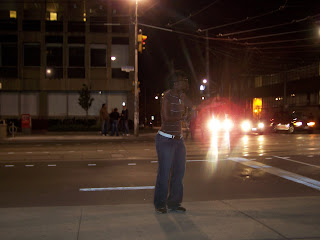We showed up 10 minutes late. He was already on stage, images of australian landscaping projected above his head, playing the didgeridoo. I knew it was a tourist trap the moment I stepped in there, but when he stopped playing he said something that really made me think. He said that the didgeridoo is the world's only Spoken Word Instrument. That's because every sound that comes out of the instrument is formulated like a word.
A spoken word instrument. I like that.
(From Wikipedia):
"The didgeridoo (or didjeridu) is a wind instrument of the Indigenous Australians of northern Australia. It is sometimes described as a natural wooden trumpet or "drone pipe". Musicologists classify it as an aerophone.
A didgeridoo is usually cylindrical or conical in shape and can measure anywhere from 1,2 and 3 metres in length with most instruments measuring around 1.2 metres. Generally, the longer the instrument, the lower the pitch or key of the instrument. Keys from D to F♯ are the preferred pitch of traditional Aboriginal players.
There are no reliable sources stating the didgeridoo's exact age, though it is commonly claimed to be the world's oldest wind instrument. Archaeological studies of rock art in Northern Australia suggests that the Aboriginal people of the Kakadu region of the Northern Territory have been using the didgeridoo for about 1500 years, based on the dating of paintings on cave walls and shelters from this period. A clear rock painting in Ginga Wardelirrhmeng from the freshwater period (1500 years ago until the present) shows a didjeridu player and two songmen (source: Journey in Time, George Chaloupka, p. 189).
The didgeridoo is sometimes played as a solo instrument for recreational purposes, though more usually it accompanies dancing and singing in ceremonial rituals. For Aboriginal groups of northern Australia, the didgeridoo is an integral part of ceremonial life, as it accompanies singers and dancers in religious rituals. Pair sticks, sometimes called clapsticks or bilma, establish the beat for the songs during ceremonies. The rhythm of the didgeridoo and the beat of the clapsticks are precise, and these patterns have been handed down for generations upon generations. Only men play the didgeridoo and sing during ceremonial occasions, whilst both men and women may dance. The taboo against women playing the instrument is not absolute; female Aboriginal didgeridoo players did exist, although their playing generally took place in an informal context[citation needed]and was not specifically encouraged. Linda Barwick, an ethnomusicologist says that traditionally women have not played the didgeridoo in ceremony, but in informal situations is no prohibition in the Dreaming Law. [2] Some sources state that the didgeridoo had other uses in ancient times. The instrument made a decent weapon because of its length and light weight and it was used for war calls to intimidate the opposing side (much like the bagpipes of Scotland). It is also suggested that the instrument was used as a large smoking pipe, where local, hallucinogenic cacti were crushed and placed in the larger opening and smoked through the smaller end by the local elders after ceremonies. The didgeridoo was also used as a means of communication across far distances. Some of the soundwaves from the instrument's infrabasses can be perceived through the ground or simply echo. Each player usually has his own base rhythm which enables others to identify the source of the message. These secondary uses of the instrument have ceased in modern times as there is no more warring between tribes, and the illegalization of drugs in Australia.[3]
There are sacred and even secret versions of the didgeridoo in Aboriginal communities in parts of Arnhem Land, Northern Territory, and the surrounding areas. These sorts of instruments have specific names and functions and some of these are played like typical didgeridoos whereas others are not."














